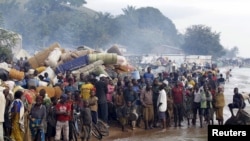The U.N. refugee agency warns that funds for humanitarian assistance for hundreds of thousands of Burundian refugees have dried up, leaving only enough cash for the most essential needs.
More than 420,000 Burundians, who have sought refuge in the neighboring Democratic Republic of Congo, Rwanda, Uganda and Tanzania, are in desperate need of humanitarian assistance; but, the U.N. refugee agency says it has practically run out of cash.
Only 19 percent of the agency’s revised $429 million appeal has been received. UNHCR spokesman Andrei Mahecic tells VOA hard choices must be made. With so little money on hand, he says priorities must be rearranged to make sure life-saving needs are met.
“But, there is a cost, there is a human cost attached to it," Mahecic said. "There simply is not enough aid to go around. The services are not kept up to the standards that they should be and, obviously, in many cases, we are now facing the situation where shelter is by now dilapidated. The tents would need replacing. Eighty-eight-thousand refugees are still living under plastic sheeting, obviously vulnerable to heavy rains and so on.”
Mahecic says many refugees risk catching communicable diseases, such as malaria and acute watery diarrhea. He says health care services must be urgently expanded. Because the money is not available, he says only 56 percent of identified survivors of sexual and gender-based violence are receiving the physical and psychological care they need.
The World Food Program, which also is suffering from underfunding, has been forced to cut monthly food rations to 60 percent in Tanzania — home to the largest number of refugees.
The UNHCR is appealing for international support so it can maintain its critical humanitarian assistance for Burundian refugees in the countries of asylum. The Burundians fled their country after violence surged in 2015. Many of them are women and children.




